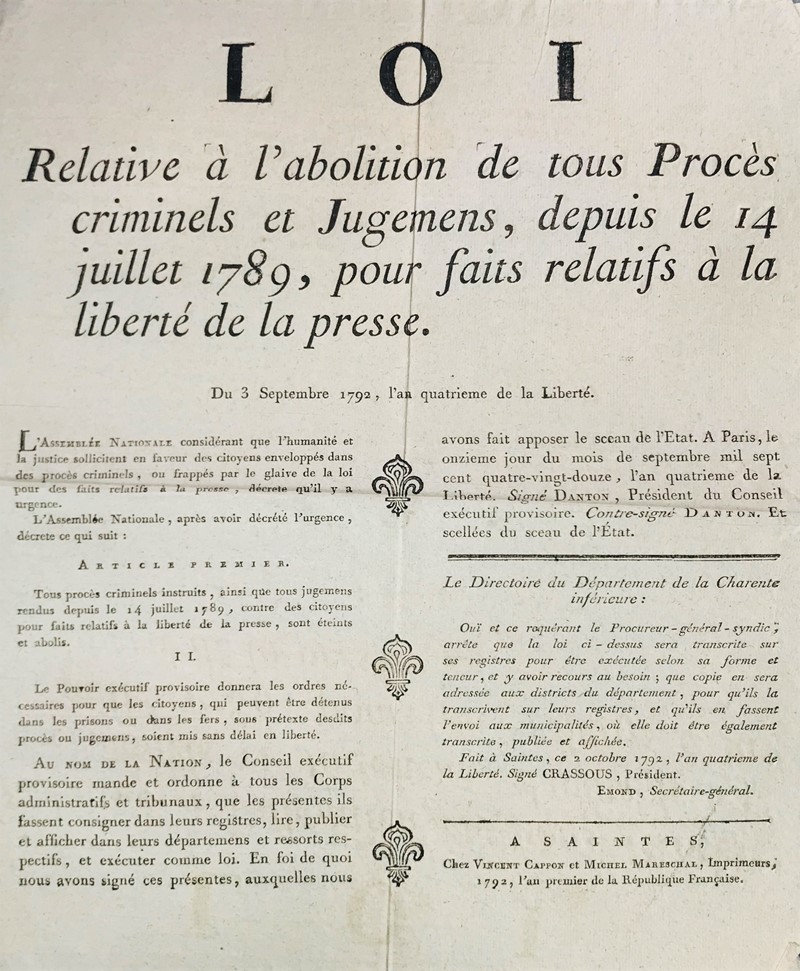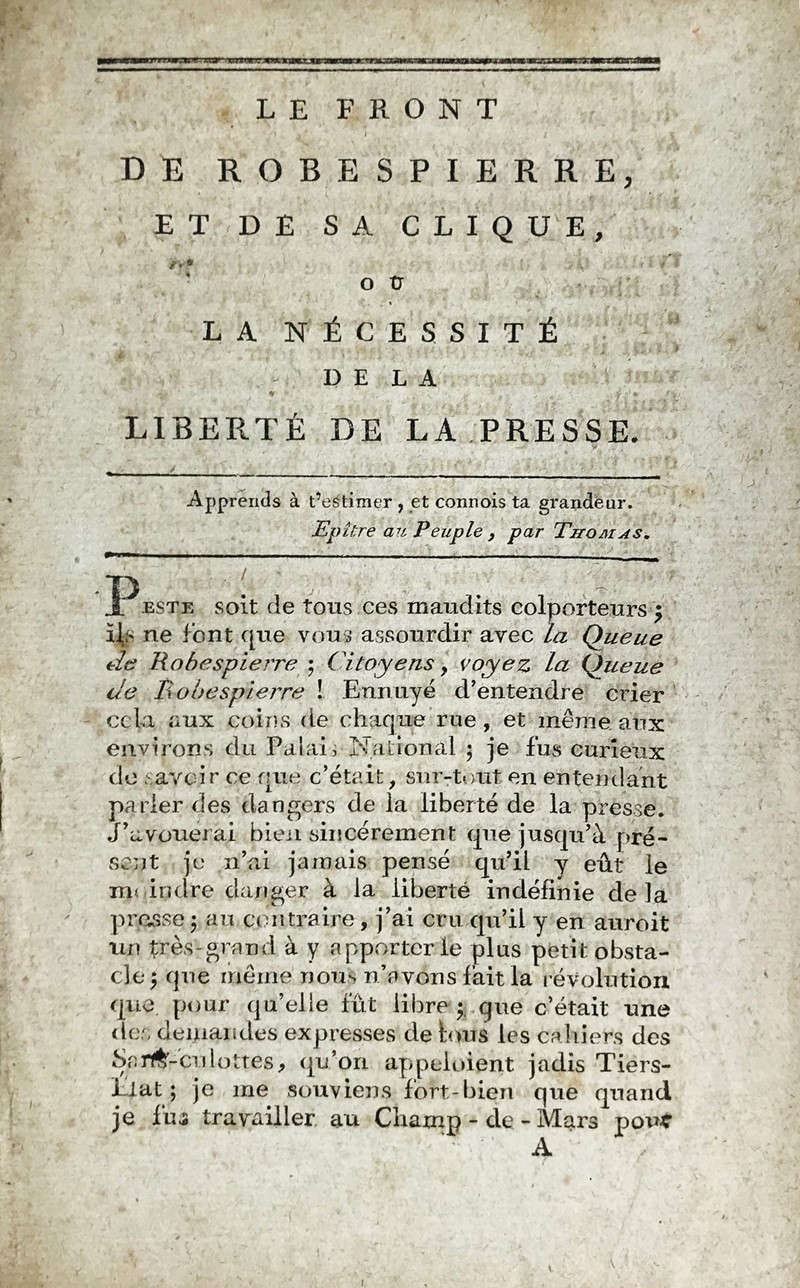FREEDOM OF THE PRESS]. ZENGER, John Peter (1697-1746). Autograph letter signed ("Jno.Peter Zenger," with large flourish on the "J" and "P"), to New York attorney James Alexander (1691-1756), n.p. [New York?], 6 May 1737. 1 page, oblong 8vo, 138 x 190 mm., irregular vertaical band of staining, small chip at top edge patched affecting one letter, otherwise in very good condition. Verso addressed by Zenger "To James Alexander Esq. New York." TWO YEARS AFTER HIS TRIAL AND ACQUITTAL, ZENGER EXPRESSES GRATITUDE TO ONE OF HIS ATTORNEYS An exceedingly rare letter of the early American printer/publisher, whose acquittal first established a fundamental principal of law--now axiomatic--that no one can be guilty of libel for speaking the truth. Zenger, who had emigrated from the German Palatinate in 1710, writes deferentially, in excellent English, to an influential New York attorney who backed his paper and served as one of his attorneys in his defense: "Sir Give me leave thus to acknowlege [ sic ] the undeserve d Favour you were pleased to confer on me last Night, as yet I am in no Capacity of making any other Returns but Thanks, accept them, not only from my self but Family, the Service it did me was great for that completed my Deliverance, if your more important Affairs can admit, I shall beg leave to be admitted to your Presence this Evening, then to assure you that while I live none shall serve you more faithfully than Your Honor's most obliged and most humble Servt. Jno Peter Zenger." Zenger, after arriving in New York, had been apprenticed to the successful New York printer William Bradford; Zenger prospered, relocated to Maryland, established his own press, and became the official printer for the colony of Maryland. In 1733 he returned to New York to establish a newspaper, the New-York Weekly Journal , in competition with Bradford's quasi-official Gazette . Zenger received the encouragement and financial backing of a group of New Yorkers who included Chief Justice Lewis Morris James Alexander, William Smith and Cadwallader Colden, who were the leaders of a reform movement opposed to the recently appointed Royal Governor, William Cosby, imperious, corrupt and tyrannical. The Morrisites--a classic reform party-- described themselves as "the party of the people"; convinced Cosby represented an attempt by the English Parliament to subvert the liberties of the colonists, they called for various reforms: the secret ballot, periodic Assembly elections, reapportionment to reflect population changes and the direct election of sheriffs and other officials. In the municipal elections of 1734, the Morrisites took control of the Common Council. Zenger's Journal comprised the chief mouthpiece of the Morrisite reformers. From its first issue it featured articles, satirical squibs and verse which charged Cosby with corruption, election fraud, influence-peddling and with "setting up personal henchmen with unlawful power to control the judicial system of New York," alluding to Associate Justice James De Lancey, who had allied himself with Cosby. Cosby and De Lancey, stung by these public criticisms, determined to silence Zenger, and Cosby issued a proclamation in November offering a reward for the authors of the "Scandalous, Virulent, False and Seditious Relections." On 17 November, after a grand jury refused to indict Zenger, he was arrested at Cosby's order on a charge of seditious libel. Four particularly offensive issues of Zenger's paper were ordered to be burnt, although the order was forbidden by the alderman. Judge De Lancey set an outlandishly high bail, in order to keep Zenger behind bars. Both the Assembly and Common Council protested, but the case moved to trial, with De Lancey presiding, in August 1735. Initially, Zenger was defended by James Alexander--to whom he here writes--and William Smith (1697-1769). Zenger continued defiantly to publish The New York Weekly Journal by dictating to his wife "thro' the Hole of the Door of t
FREEDOM OF THE PRESS]. ZENGER, John Peter (1697-1746). Autograph letter signed ("Jno.Peter Zenger," with large flourish on the "J" and "P"), to New York attorney James Alexander (1691-1756), n.p. [New York?], 6 May 1737. 1 page, oblong 8vo, 138 x 190 mm., irregular vertaical band of staining, small chip at top edge patched affecting one letter, otherwise in very good condition. Verso addressed by Zenger "To James Alexander Esq. New York." TWO YEARS AFTER HIS TRIAL AND ACQUITTAL, ZENGER EXPRESSES GRATITUDE TO ONE OF HIS ATTORNEYS An exceedingly rare letter of the early American printer/publisher, whose acquittal first established a fundamental principal of law--now axiomatic--that no one can be guilty of libel for speaking the truth. Zenger, who had emigrated from the German Palatinate in 1710, writes deferentially, in excellent English, to an influential New York attorney who backed his paper and served as one of his attorneys in his defense: "Sir Give me leave thus to acknowlege [ sic ] the undeserve d Favour you were pleased to confer on me last Night, as yet I am in no Capacity of making any other Returns but Thanks, accept them, not only from my self but Family, the Service it did me was great for that completed my Deliverance, if your more important Affairs can admit, I shall beg leave to be admitted to your Presence this Evening, then to assure you that while I live none shall serve you more faithfully than Your Honor's most obliged and most humble Servt. Jno Peter Zenger." Zenger, after arriving in New York, had been apprenticed to the successful New York printer William Bradford; Zenger prospered, relocated to Maryland, established his own press, and became the official printer for the colony of Maryland. In 1733 he returned to New York to establish a newspaper, the New-York Weekly Journal , in competition with Bradford's quasi-official Gazette . Zenger received the encouragement and financial backing of a group of New Yorkers who included Chief Justice Lewis Morris James Alexander, William Smith and Cadwallader Colden, who were the leaders of a reform movement opposed to the recently appointed Royal Governor, William Cosby, imperious, corrupt and tyrannical. The Morrisites--a classic reform party-- described themselves as "the party of the people"; convinced Cosby represented an attempt by the English Parliament to subvert the liberties of the colonists, they called for various reforms: the secret ballot, periodic Assembly elections, reapportionment to reflect population changes and the direct election of sheriffs and other officials. In the municipal elections of 1734, the Morrisites took control of the Common Council. Zenger's Journal comprised the chief mouthpiece of the Morrisite reformers. From its first issue it featured articles, satirical squibs and verse which charged Cosby with corruption, election fraud, influence-peddling and with "setting up personal henchmen with unlawful power to control the judicial system of New York," alluding to Associate Justice James De Lancey, who had allied himself with Cosby. Cosby and De Lancey, stung by these public criticisms, determined to silence Zenger, and Cosby issued a proclamation in November offering a reward for the authors of the "Scandalous, Virulent, False and Seditious Relections." On 17 November, after a grand jury refused to indict Zenger, he was arrested at Cosby's order on a charge of seditious libel. Four particularly offensive issues of Zenger's paper were ordered to be burnt, although the order was forbidden by the alderman. Judge De Lancey set an outlandishly high bail, in order to keep Zenger behind bars. Both the Assembly and Common Council protested, but the case moved to trial, with De Lancey presiding, in August 1735. Initially, Zenger was defended by James Alexander--to whom he here writes--and William Smith (1697-1769). Zenger continued defiantly to publish The New York Weekly Journal by dictating to his wife "thro' the Hole of the Door of t















Testen Sie LotSearch und seine Premium-Features 7 Tage - ohne Kosten!
Lassen Sie sich automatisch über neue Objekte in kommenden Auktionen benachrichtigen.
Suchauftrag anlegen